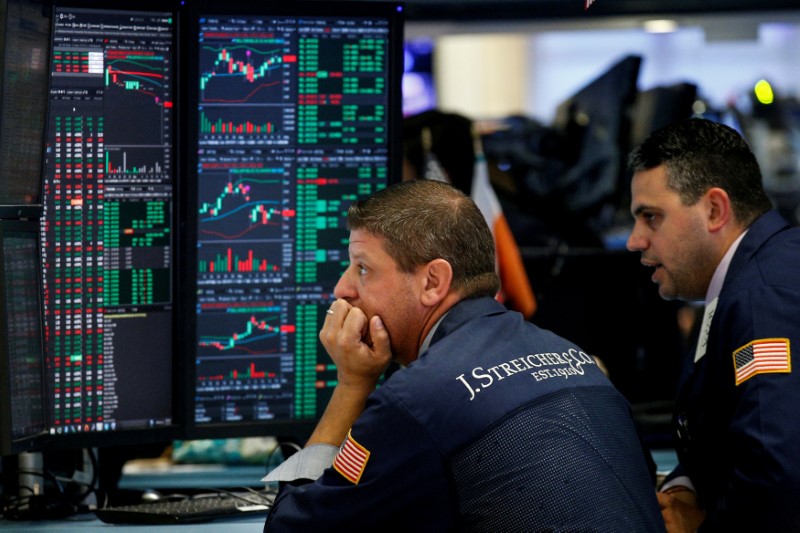By Chuck Mikolajczak and Stephanie Kelly
NEW YORK (Reuters) - World stock markets slipped from a record high on Thursday after a flurry of tepid corporate earnings reports but were off session lows as Wall Street pared losses, while demand for safe-haven assets pushed U.S. Treasury yields lower.
Signs of poor demand for Apple's iPhone 8 dragged each of the major Wall Street indexes down a day after the Dow Industrials cracked the 23,000 barrier for the first time. Shares of Apple (NASDAQ:AAPL) fell 2.5 percent to $155.78.
"Clearly, Apple is one of the biggest contributors every year when it comes to earnings, so you have to keep an eye on it," said Andres Garcia-Amaya, CEO at Zoe Financial in New York.
"More important, one of the things I am going to be keeping an eye on this season is the breadth of earnings beats. In other words, is it just coming from one sector or is it coming from across a number of sectors."
Of the 11 major S&P sector groups, technology, off 0.52 percent, was the biggest drag.
Traders were marking 30 years to the day since the 1987 Black Monday stock market crash, although many market participants considered another such crash unlikely.
The Dow Jones Industrial Average fell 19.61 points, or 0.08 percent, to 23,137.99, the S&P 500 lost 1.56 points, or 0.06 percent, to 2,559.7 and the Nasdaq Composite dropped 30.59 points, or 0.46 percent, to 6,593.64.
European shares notched their largest drop in two months on concerns over political upheaval in Spain and after disappointing results from large companies such as Unilever (LON:ULVR), France's Publicis and Germany's Kion.
Spain's central government said it would suspend Catalonia's autonomy and impose direct rule after the region's leader threatened to go ahead with a formal declaration of independence if Madrid refused to hold talks.
The pan-European FTSEurofirst 300 index lost 0.60 percent and MSCI's gauge of stocks across the globe shed 0.10 percent.
Madrid's IBEX ended down 0.74 percent, after dropping as much as 1 percent.
Also putting a damper on risk appetite was data from China, which showed economic growth cooled slightly to 6.8 percent in the third quarter from a year earlier, compared with the second quarter's 6.9 percent.
Other data showed China's industrial output rose a stronger-than-expected 6.6 percent in September, while retail sales also outperformed.
But property sales fell for the first time in over two years. In addition, People's Bank of China Governor Zhou Xiaochuan spoke of the risks of a "Minsky moment" in the economy, referring to a sudden collapse in asset prices sparked by debt or currency pressures.
The dollar index fell 0.15 percent after touching a six-day low of 93.055, with the euro up 0.41 percent to $1.1835.
Benchmark 10-year notes last rose 6/32 in price to yield 2.3196 percent, from 2.339 percent late on Wednesday.
